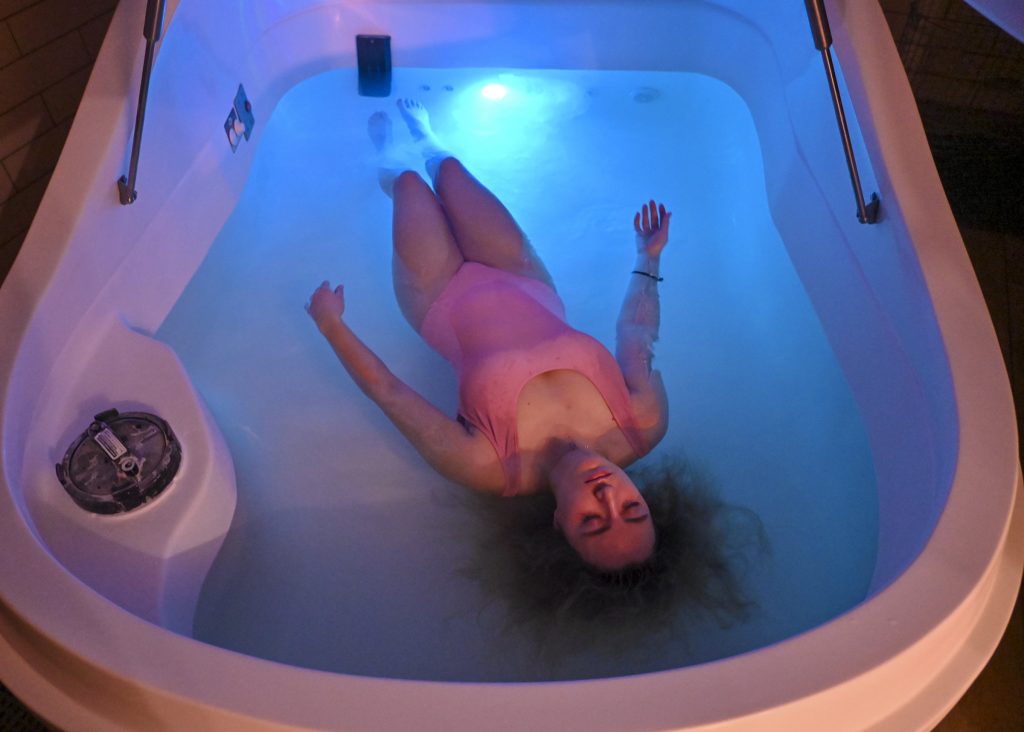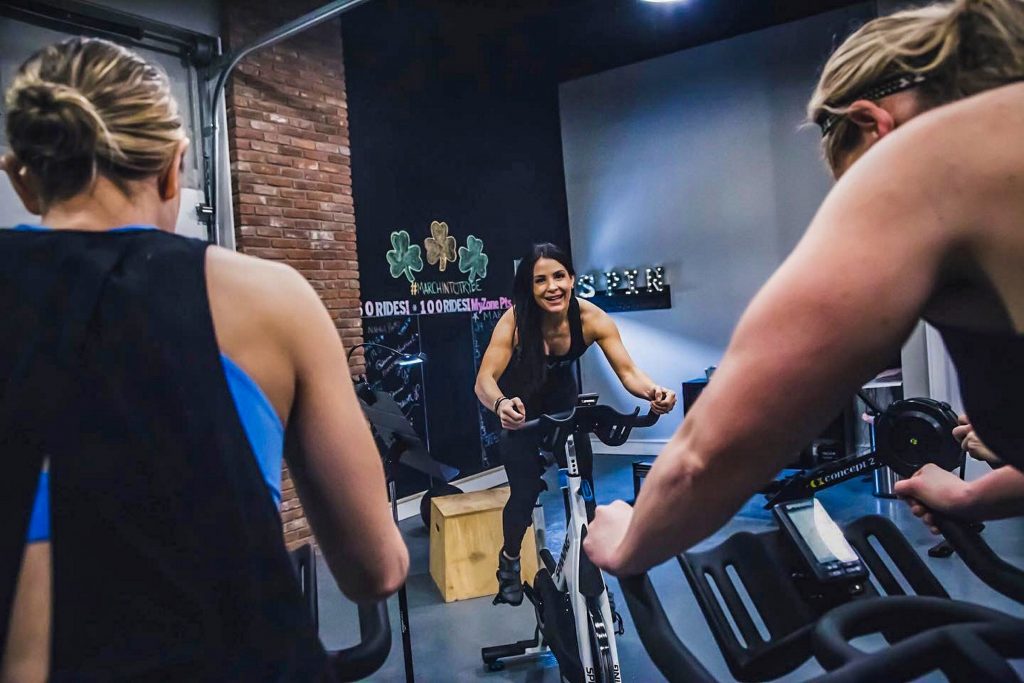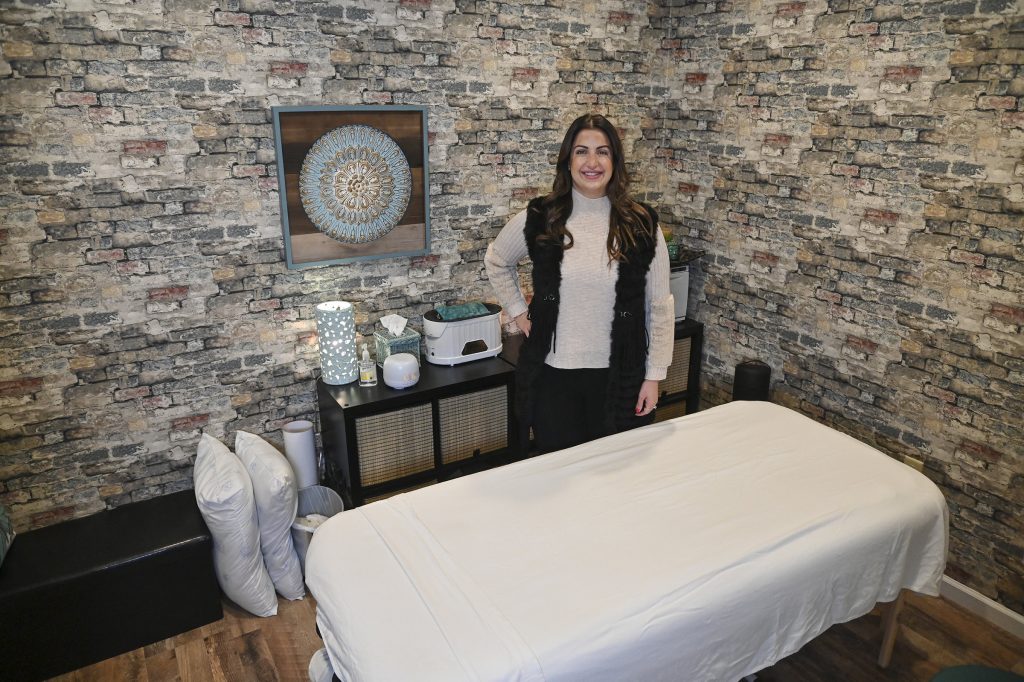Everyone could use a reset this year.
Although 2020’s now in the rearview mirror, many people still feel the effects of its stress. But with a little self-care, they can step into 2021 renewed, refreshed and reenergized. Self-care is imperative to your overall well-being. While that sometimes means relaxation, it also involves putting in the necessary work to be your best self.
Licensed professional counselor Amanda Gentile opened Giving Tree Wellness Center, 311 Penn Ave., Scranton, in 2017 as a place to offer mental health services with an array of holistic therapies as well. Taking care of one’s mental health is No. 1, Gentile said, and she noticed more people than ever reached out for help over the past year. And she doesn’t think it will slow down in 2021, which is a good thing.
“Right now, I’m really busy because there were so many people reaching out for help,” Gentile said. “This year really put everybody through the ringer. It’s important to talk about the things going on in your life, whether they relate to what’s going on in the world or not. This year, though, everything and every part of our lives were affected. You need that third party to listen as you’re getting things off your chest.”
Mental health counseling
Counseling isn’t a “luxury” or anything to be ashamed of, for that matter. We take care of our bodies through eating right and exercise, Gentile said, and if we had a broken arm, we would go to the doctor. Seeking mental health counseling is the same. Gentile and Giving Tree’s other licensed professional counselor, Cheryl Pappa, help their clients integrate journaling, mediation and more alternative therapies for overall well-being along with professional counseling.
As far as mental health goes, the most helpful thing we can do right now is avoid falling into mental isolation. While it’s important to physically social distance, Gentile said, that’s not necessarily good for us mentally. We must abide by guidelines to stay healthy and safe, but we can’t completely lose contact with others. Stay in touch with family and friends, and if you feel like you’re really struggling, reach out to a professional for help.
“People are slipping into isolation and not realizing it, not talking to anyone, not engaging with others,” Gentile said. “That can lead to anxiety and depression, and they don’t know why they feel like this, and maybe they start falling into unhealthy habits to cope. … Everyone should prioritize their mental health, especially after the year (2020 has) been.”
Float therapy
Many of Giving Tree’s offerings overlap when it comes to improving someone’s well-being. Its float pods – also referred to as sensory deprivation tanks – are filled with water and Epsom salt so a person can float effortlessly in skin-temperature water. This promotes peaceful relaxation and meditation and also can help with pain relief, sleep issues, depression, anxiety, mental health issues, blood pressure and skin problems. Studies also have linked stress management to the boosting of a person’s immune system.

JASON FARMER / STAFF PHOTOGRAPHER Morgan McCool of Dunmore relaxes with float therapy at the Giving Tree Wellness Center in Scranton.
“It’s a place for you to be mindful and just float,” Gentile said. “That feeling of weightlessness – you may not understand it until you’re doing it, but it’s an amazing wellness tool. … If you’re going to therapy and working out, there are these other things we offer that can supplement a healthier lifestyle and feeling better all over.”
Massage therapy and reiki also provide benefits for mind and body. Giving Tree offers Swedish, deep tissue, pre-natal, ayurvedic, reflexology, scalp, neck and shoulder massages as well as reiki, a Japanese energy work technique for stress reduction, relaxation and even pain relief. (All sessions follow strict COVID-19 guidelines, Gentile said.)
From massages that use dry brushing – known to to exfoliate as well as promote lymphatic drainage and improve circulation – and those that incorporate aromatherapy, hot stones and CBD crème, these services can not only soothe a tired body but also relax you and decrease your stress levels so you feel refreshed and rejuvenated.
Regular exercise
Getting your blood pumping obviously helps your body, but it also can help you handle stress better and improve your mental health. To get up and get in a workout or take some classes will have “such an effect on the way you’re going to feel and the outlook you have,” Gentile said.
Inside Giving Tree, Trybe Boutique Fitness Studio offers an array of spinning, strength, barre and HIIT classes plus small-group training specifically for women. Trybe founder Michelle Romanaskas worked as an occupational therapist and registered nurse before turning her interest in health and fitness into a career. Thanks to her medical background, Romanaskas knows firsthand the impact exercise and nutrition have on everything from mental health to boosting immunity.

SUBMITTED PHOTO TRYBE Boutique Fitness Studio is located inside the Giving Tree Wellness Center in downtown Scranton.
“Fitness and nutrition are really everything,” Romanaskas said. “When we’re talking about a year like 2020, we want to bulk up our immune system to be stronger and healthier and be able to bounce back faster. … After years of seeing the other side of it, that’s why I moved into this space of preventative health. … Fitness and nutritions works from the inside out. Not only will fitness help aesthetically, but also it helps with anxiety, depression, getting better sleep, boosting your immune system. I’ve seen so many women really take control of their health and their lives by working out and finding their balance.”
Though Trybe must remain closed until Jan. 4 because of state pandemic restrictions, Romanaskas has offered free online fitness classes through Facebook in the private group Fitness Over Fear. She streams a variety of exercises in the group, encouraging participants to use chairs in place of a barre and soup cans or water bottles if they don’t have light weights at home. Also, on Trybe Live, new and existing Trybe members can complete daily virtual workouts at home. The accountability of a workout class, working with a professional or setting realistic goals are what helps fitness and nutrition changes stick, she said.
“It’s about a full lifestyle change and long-term success,” she said. “After this year and everything we’ve seen, now is the time to shift the focus to prioritize your health.”
Eating healthy
Nutrition remains an important part of a person’s overall well-being, added Gentile, whose cafe at Giving Tree offers coffees and teas as well as health-conscious options such as detox drinks, smoothies, overnight oatmeal and chia bowls. Adding these fresh options to someone’s diet helps bolster the immune system, Gentile said. Wellness shots and juices are filled with vitamins, minerals and antioxidants that help keep the body healthy with superfoods, fruits, vegetables and spices.

LAURA RYSZ, STAFF PHOTOGRAPHER Front row: Green Love Bagel Sandwich, Sunrise Bagel Sandwich, Golden Milk; back row: the Mantra Smoothie Bowl, The Warrior Smoothie Bowl and Skull Crusher at the Giving Tree Wellness Center
Gentile hopes everyone takes a step back and prioritizes themselves and their overall health in 2021.
“Honestly, focus on you,” she said. “I feel like people are so anxious that they can’t control anything that’s happening right now. Your own mind, body and spirit and what makes you happy and grounds you is something that you can control. When you put yourself first, that’s the way to be the best version of yourself.”
More information
To book an appointment at Giving Tree Wellness Center, call 570-800-1963 or visit thegivingtreewellnesscenter.com.
To participate in TRYBE Boutique Fitness Studio’s free online workouts during the pandemic, visit the Fitness Over Fear Facebook group. For more information about TRYBE, visit trybefit.com, email trybe@trybefit.com or call 570-446-9290.
What is therapy?
A beginner’s guide to mental health
Once you find a therapist, your first session will be what’s known as intake, said Dorian Traube, an assistant professor at University of Southern California. Therapists introduce themselves, tell you about their background and specialty, and ask what brings you to therapy. There is no right or wrong answer: “Everything is just a lot right now” is a perfectly valid reason to seek an expert’s help.
Your therapist might give you a survey about what symptoms you’re experiencing and other indicators of your mental health, like your sleep habits, employment status and any drug and alcohol use. This helps the therapist get a fuller picture of your life to guide his or her responses.
After intake – which may last up to three sessions, Traube said – you move on to regular therapy sessions.
Often, therapists combine or draw from multiple therapeutic approaches. Here’s a starting place to see what kind of therapy might be best for you.
Talk therapy, aka psychodynamic therapy: This is the type of therapy you typically see on TV and in movies – a structured space to talk about your feelings and experiences and how your past shapes your present. Suitable for depression, anxiety and a wide range of other issues and conditions, it’s usually more long-term than other types of therapies.
Cognitive behavioral therapy: CBT tends to be a more short-term form of therapy with a specific goal you’re looking to achieve, like identifying and replacing negative thought patterns or challenging irrational beliefs. This can work best for people with specific anxieties, phobias, obsessive-compulsive disorder, eating disorders and substance abuse – issues where there are beliefs or patterns involved that the patient wants to change. Trauma-focused CBT and behavioral therapies such as aversion therapy and systematic desensitization are subsets. Dialectical behavioral therapy is an offshoot of CBT that focuses on regulating emotions.
Humanistic therapy: A more whole-person approach that helps empower patients to make choices, it’s particularly beneficial for people with self-esteem issues or who deal with indecision or don’t trust themselves to make decisions.
Eye movement desensitization and reprocessing: EMDR is a newer type of therapy that’s shown to be particularly helpful for people dealing with post-traumatic stress disorder, traumatic memories or disturbing life experiences. Therapists need to be specifically trained and certified to do EMDR, which involves patients revisiting negative memories while tracking the therapist’s hand as it moves.
Group therapy: Certain issues might be best addressed in a therapist-led group setting, said Harden Bradford, the Therapy for Black Girls founder. She said that, for instance, if you have social anxiety or difficulty relating to others, “Group therapy is going to be the best way to get at that work, because you’re going to be able to get feedback in real time from other people.”
Art therapy, bibliotherapy, music therapy and dance therapy: These alternative modalities of community are best suited for people who struggle to communicate or express themselves in words.
– Jessica Roy, Los Angeles Times

Gia Mazur is an award-winning staff writer and beauty obsessive who joined The Times-Tribune’s Lifestyles department in 2015. She’s a product enthusiast who can’t live without an eyelash curler. A proud Virgo, Charlotte Tilbury Matte Revolution Lipstick in Pillow Talk is her go-to. Contact: gmazur@timesshamrock.com; 570-348-9127; @gmazurTT




